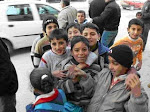In January of 1988, a small group of Israeli women donned in black clothing came together in Jerusalem and raised a black sign in the shape of a hand with white lettering that read 'Stop the Occupation.' Women in Black, Jewish and Palestinian citizens of Israel, have held weekly protest vigils ever since to express their belief in peace and to demand that the Israeli Occupation of the Palestinian Territories come to an end. Protests against the Occupation soon spread to other cities around Israel and then to other countries. On Friday, January 15, our delegation joined the weekly vigil at Hagar (Paris) Square, a major traffic intersection in West Jerusalem. We were greeted warmly by the organizers and given signs in English, Hebrew, and Arabic to hold up. About forty people gathered that hour – young and old, women and men, Israelis and internationals. (Besides our group, a few members of the Ecumenical Accompaniment Program in Palestine and Israel were there.)
I first learned of Women in Black in the late 1980s, shortly after they began protesting the Occupation. I was very glad to have this opportunity to join their vigil, especially after our delegation had seen for ourselves the suffering of Palestinian people from the Occupation. Women in Black declare in a flyer that the Occupation is "morally wrong and obstructs the path to peace" and that its practices "violate international law and undermine the foundations of decency and morality." They acknowledge "reversals in the peace process," but "are more convinced than ever that there is no military solution to the conflict." Only an end to the occupation will bring a peace "based on the just interests of both peoples. "
The response of passers-by on foot and in vehicles reminded me of the response our group in suburban southern California received when we were protesting the build-up to a U.S. war with Iraq. The many horns honked in support, peace signs, or thumbs up were encouraging. The thumbs down were discouraging, the shouts of traitor or "I hope you die in a terrorist attack" disturbing. Women in Black are also heckled with sexual slurs, which were particularly unsettling.
I talked to two of the women after the protest ended, asking them why they have continued to protest every week for 22 years. The first one told me that she came because the occupation had not ended. Ruth El-Raz, one of the co-founders of the group, told me that she no longer has hope that change will come but that she must live as if there is hope; that they are "a symbol." She wanted me to report that Women in Black has become an international movement of women of conscience who hold vigils to protest violence in their own part of the world, including war, inter-ethnic conflict, militarism, the arms industry, racism, and violence against women or in neighborhoods . Each vigil is autonomous, though all the women wear black to symbolize the tragedy of the victims of violence. What unites them is their "commitment to justice and a world free of violence."




1 comment:
Post a Comment